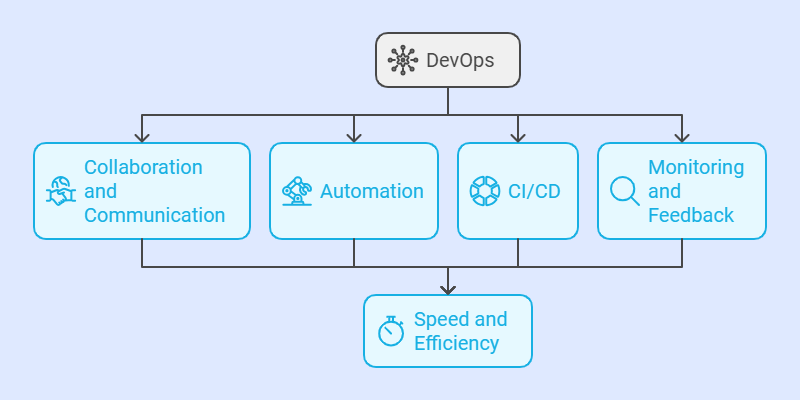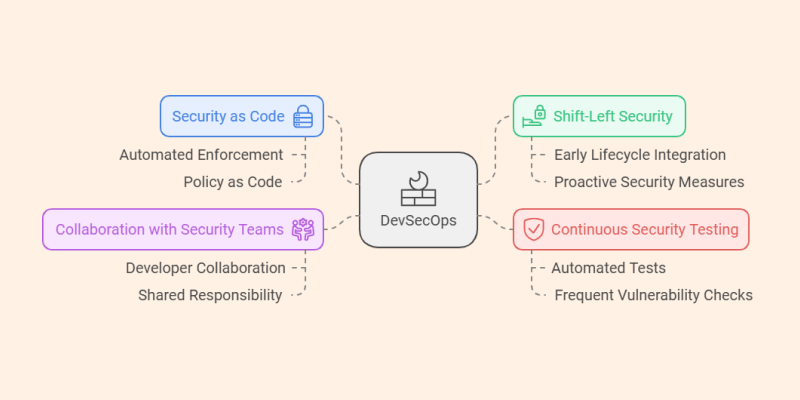Understanding the Differences between DevOps & DevSecOps
Introduction
In today’s tech-driven world, organizations strive to deliver software faster, more reliably, and more securely. DevOps and DevSecOps have emerged as two essential practices aimed at optimizing software development and delivery. While they share similar goals, they approach these goals differently, especially when it comes to security. In this article, we’ll explore what DevOps and DevSecOps are, their differences, and why organizations are increasingly adopting DevSecOps for a more secure development process.
What is DevOps?
DevOps combines Development (Dev) and Operations (Ops) to streamline and accelerate the software delivery process. By breaking down silos between development and operations teams, DevOps aims to improve collaboration, automation, and efficiency. Here are some key aspects of DevOps:

- Collaboration and Communication: DevOps encourages collaboration between developers and operations teams to ensure a smooth workflow from code development to deployment.
- Automation: Automation tools are heavily used to streamline repetitive tasks, from code testing to deployment, minimizing the risk of human error and saving time.
- Continuous Integration & Continuous Delivery (CI/CD): These practices are core to DevOps, enabling developers to integrate code changes frequently, test them, and deploy them continuously.
- Monitoring and Feedback: DevOps uses monitoring and real-time feedback to identify issues quickly, allowing teams to address them immediately.
In short, DevOps focuses on speed, efficiency, and a collaborative culture to deliver software quickly and reliably. However, in traditional DevOps practices, security is often addressed late in the development process, leading to potential vulnerabilities.
Here are some tools that help in DevOps:
- Git
- Jenkins
- GitHub Actions
- Chef
- Docker
- Kubernetes
- Terraform
- Grafana
What is DevSecOps?
DevSecOps builds on DevOps by integrating security practices into the entire software development lifecycle (SDLC) rather than treating security as an afterthought. The “Sec” in DevSecOps stands for Security, and it’s introduced early in the process to catch and fix security issues as soon as possible.
Here’s how DevSecOps works:

- Security as Code: DevSecOps involves writing security policies as code, so they’re automatically enforced across the development pipeline.
- Shift-Left Security: Security is “shifted left,” meaning it is integrated from the beginning of the development lifecycle rather than at the end.
- Continuous Security Testing: Automated security tests are run continuously to detect vulnerabilities in code early and often.
- Collaboration with Security Teams: In DevSecOps, security experts work closely with developers and operations teams, fostering a culture of shared responsibility for security.
DevSecOps ensures that security measures are embedded into each phase of the development process. By focusing on “security-first,” organizations can reduce security risks without sacrificing the speed and agility of DevOps.
Here are Some of the tools that will help in DevSecOps:
- Git
- Jenkins (with security plugins)
- Terraform (with security modules)
- AWS CloudFormation (with security checks)
- Snyk
- Aqua Security
- Docker Bench for Security
- Veracode
- AWS Secrets Manager
- AWS IAM
- Grafana
- Open Policy Agent (OPA)
- Kali Linux
- AWS Security Hub
Key Differences Between DevOps and DevSecOps
Why is DevSecOps Important?
While DevOps improves efficiency, security threats and data breaches have become more sophisticated. A security vulnerability can lead to costly repercussions like data loss, legal implications, and damage to brand reputation. Here’s why DevSecOps is increasingly essential:
- Proactive Security: By integrating security from the start, DevSecOps helps catch vulnerabilities before they reach production.
- Reduced Costs: Fixing security issues early is significantly cheaper than dealing with security breaches post-deployment.
- Regulatory Compliance: DevSecOps makes it easier to comply with security regulations, as security practices are embedded throughout the process.
- Enhanced Trust: With DevSecOps, organizations can demonstrate a commitment to security, gaining customer trust and confidence.
Implementing DevSecOps: Best Practices
- Automated Security Testing: Use automated tools to run security scans and tests as part of your CI/CD pipeline. This helps to identify vulnerabilities early and often.
- Security Training for Teams: Developers and operations teams should receive security training to help them recognize and mitigate potential threats.
- Use of Secure Coding Practices: Adopt secure coding standards to minimize vulnerabilities from the outset.
- Threat Modeling: Anticipate potential threats by identifying possible security risks and designing countermeasures during the planning stages.
Conclusion
While DevOps focuses on efficiency, collaboration, and speed, DevSecOps takes it a step further by embedding security into every aspect of the development process. DevSecOps is not a replacement for DevOps but rather an evolution that adds a critical layer of security. As threats continue to evolve, DevSecOps enables organizations to deliver high-quality software without compromising on security.
Adopting DevSecOps might require a cultural shift, training, and new tools, but the benefits far outweigh the investment. By combining speed with security, DevSecOps ensures a streamlined process that’s both agile and resilient to modern cybersecurity threats.
